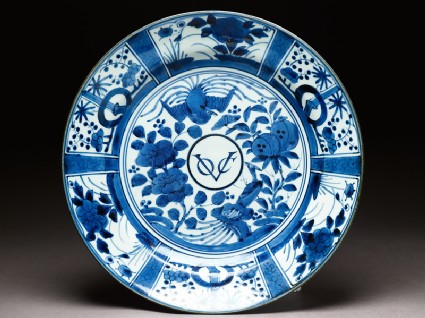Room 37 | Japan 1600-1850 gallery
Discover the arts of the Edo period (1600-1868) from porcelain to lacquer to painting.

Galleries : 175 objects
- Reference URL
Actions
Plate with Dutch East India Company monogram
-
Details
- Associated place
-
Asia › Japan › Kyūshū › Saga prefecture › Arita › Arita kiln-sites (place of creation)Asia (possible original location)Europe › Netherlands (possible original location)
- Date
-
1660 - 1690
Edo Period (1600 - 1868)
- Associated people
-
Dutch East India Company (VOC) (owner)
- Material and technique
- porcelain, with underglaze painting in blue
- Dimensions
-
6.8 cm (height)
39.7 cm (diameter)
- Material index
- Technique index
- Object type index
- No. of items
- 1
- Credit line
- Presented by M. C. and J. W. Christie-Miller, 1976.
- Accession no.
- EA1976.53
-
Further reading
Impey, Oliver, Japanese Export Porcelain: Catalogue of the Collection of the Ashmolean Museum, Oxford (Amsterdam: Hotei Publishing, 2002), no. 27 on p. 51, p. 20, illus. p. 51
Impey, Oliver, The Early Porcelain Kilns of Japan: Arita in the First Half of the Seventeenth Century, Oxford Oriental Monographs (Oxford: Clarendon Press, 1996), ppp. xiii, 11, 28 & 103, illus. p. 11 fig. 5 (black and white)
Glossary (2)
porcelain, underglaze painting
-
porcelain
Ceramic material composed of kaolin, quartz, and feldspar which is fired to a temperature of c.1350-1400⁰c. The resulting ceramic is vitreous, translucent, and white in colour.
-
underglaze painting
Painting applied to ceramic material before a transparent, or monochrome or coloured glaze for Islamic objects, is applied. The technique was initially developed in China.
Location
Objects are sometimes moved to a different location. Our object location data is usually updated on a monthly basis. Contact the Jameel Study Centre if you are planning to visit the museum to see a particular object on display, or would like to arrange an appointment to see an object in our reserve collections.
Galleries
Notice
Objects may have since been removed or replaced from a gallery. Click into an individual object record to confirm whether or not an object is currently on display. Our object location data is usually updated on a monthly basis, so contact the Jameel Study Centre if you are planning to visit the museum to see a particular Eastern Art object.
© 2013 University of Oxford - Ashmolean Museum









